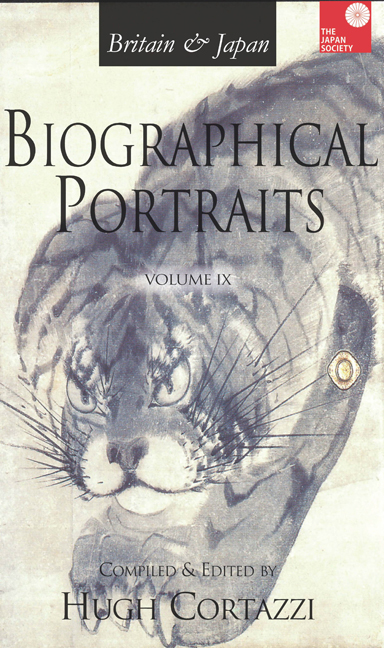Book contents
- Frontmatter
- Contents
- Introduction
- List of Contributors
- Index of Biographical Portraits in Japan Society Volumes
- PART I JAPAN IN BRITAIN: THINGS JAPANESE
- PART II BRITAIN IN JAPAN: TRADE
- BRITISH ACTIVITIES
- MISSIONARIES
- MUSIC, DRAMA AND FILM
- EPISODE
- PAINTERS
- JOURNALISTS
- JAPANESE WOMEN PIONEERS
- PART III SCHOLARS AND WRITERS: JAPANESE
- BRITISH
- PART IV POLITICIANS AND OFFICIALS: JAPANESE
- BRITISH OFFICERS
- BRITISH JUDGES AND A DIPLOMAT
- BRITISH POLITICAL FIGURES
- Index
49 - Robert Anderson Mowat (1843–1925): Judge of the British Court for Japan, 1891–1897
Published online by Cambridge University Press: 30 April 2022
- Frontmatter
- Contents
- Introduction
- List of Contributors
- Index of Biographical Portraits in Japan Society Volumes
- PART I JAPAN IN BRITAIN: THINGS JAPANESE
- PART II BRITAIN IN JAPAN: TRADE
- BRITISH ACTIVITIES
- MISSIONARIES
- MUSIC, DRAMA AND FILM
- EPISODE
- PAINTERS
- JOURNALISTS
- JAPANESE WOMEN PIONEERS
- PART III SCHOLARS AND WRITERS: JAPANESE
- BRITISH
- PART IV POLITICIANS AND OFFICIALS: JAPANESE
- BRITISH OFFICERS
- BRITISH JUDGES AND A DIPLOMAT
- BRITISH POLITICAL FIGURES
- Index
Summary
INTRODUCTION
ROBERT ANDERSON MOWAT was one of six judges responsible for the administration of British justice in Japan during the period of British extra-territoriality from 1859 to 1899. Born in Edinburgh in 1843, the only son of Joseph Mowat, he was educated in Edinburgh and at University College, London.
From 1860, the British government built up a cadre of linguistically trained consular officers. Appointment to any consular position involved patronage and candidates, aged eighteen to twenty-four, being recommended to the Foreign Secretary who then nominated those of whom he approved for examination by the Civil Service Commissioners who, as needs arose and budgets permitted, held competitive examinations on an irregular basis to recruit Student Interpreters for the Consular Service in China and Japan. In 1864 there were five vacancies. Mowat (recommended by London University) came second in the examinations held that year – behind William George Aston, who went on to be a consul in Japan, and ahead of Hiram Shaw Wilkinson and George Jamieson, both of whom also played contemporaneous roles in the administration of British justice in Japan and China. Upon passing his Student Interpreter-ship examinations, he joined the China Consular Service.
At the same time, the British government had induced Sir Edmund Hornby to supervise the consular courts, through which British extra-territorial jurisdiction was exercised in China and Japan, from a newly established Supreme Court based in Shanghai. The Supreme Court establishment consisted of a Judge (Hornby), an Assistant Judge (Charles Wycliffe Goodwin) and a Law Secretary (John Fraser). While the Judge and the Assistant Judge needed to be legally qualified, the Law Secretary could be unqualified.
LAW SECRETARY, 1868–1878
When Fraser died in 1868, Mowat was appointed Law Secretary in his place. In 1869, when he was entitled, having been in China for five years, to leave, he applied for a year's home leave. Mowat explained that his chief purpose in doing so was to read law in order to qualify himself for his duties. His application was supported both by Hornby and by Sir Rutherford Alcock, then Minister in Beijing, who both favoured consuls obtaining a legal qualification. During his furlough, Mowat was replaced by Jamieson, as acting Law Secretary.
- Type
- Chapter
- Information
- Britain & Japan Biographical Portraits Vol IX , pp. 544 - 554Publisher: Amsterdam University PressPrint publication year: 2015



